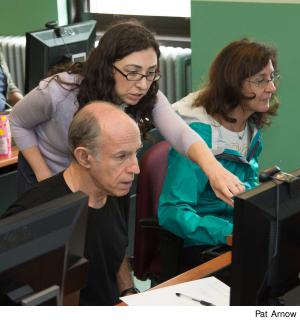Faculty and staff at City Tech were dissatisfied with existing software for higher education – so they built their own. The result is OpenLab, a collaborative tool for teaching and learning that’s now widely used at the college.
City Tech Coordinator of Library Instruction Maura Smale, one of the first directors of the initiative, says they set out to create a site that would help students feel more connected at the commuter campus. Everything from the back-end development to the airy site design to the OpenLab logo was created by City Tech faculty, staff and students.
 |
“It really encourages a sense of community, because you can see what’s happening, what courses are going on,” Smale told Clarion. “We’ve had students say they’ll look at other courses in their program just to see what those students are doing in the class.” OpenLab’s emphasis on collaboration makes it well suited for this kind of cross-class connection, or for a joint project that two or more classes might work on together.
OpenLab is part of a five-year City College initiative funded by the federal government with a grant that ends next fall. The site isn’t just limited to course pages, though that’s its primary use. City Tech clubs can create pages, groups can create projects and City Tech students can create their own electronic portfolios, compiling work done in several classes. To date, more than 500 City Tech faculty and 9,000 City Tech students have created a page through the lab.
In terms of OpenLab’s use with courses, Smale says, the aim was to create a pedagogical tool, not a course-management tool like Blackboard. She says the “openness” of OpenLab has advantages and it’s a nice option to have.
“It’s a place for work to take place and not to just be stored,” Smale remarked. “In some sense, work just ends up on Blackboard. It’s less of a place where work is actively happening.”
OpenLab takes inspiration from other CUNY initiatives, like the CUNY Academic Commons developed at the Graduate Center. Both sites were developed by the same lead developer and use a WordPress platform that connects its pages with the online social networking tool BuddyPress.
Collaboration
Compared to the Commons, “the main difference is that OpenLab is more course-centered” says Jody Rosen, a co-director of the OpenLab project. “There are a few courses that are taught on [the Academic Commons], but by and large it’s not really course-focused – it’s more interest-group focused.”
Rosen, an assistant professor of English, used OpenLab last Spring in a hybrid course (both online and in person) titled “Introduction to Women Writers.” She had her students respond to readings with blog posts and make video presentations, all of which were posted on her OpenLab course site. Like other WordPress sites, course sites can have RSS feeds, and post YouTube videos and SlideShare presentations.
In one learning community, where the same students were taking classes in both hospitality management and English, they created “#TheGuide” for other first-year students at City Tech. In it students explored “local grub,” gave tips on good study skills and explored things to do on the Brooklyn waterfront.
Jenna Spevack, an associate professor of advertising design, says that her graphic-design course websites on OpenLab work well as a virtual sketchbook. Spevack, who is also a co-director of the OpenLab project, says an important aspect of the platform is teaching the process of design, with her students learning to “revise, revise, revise.”
Online Portfolios
Early in the semester in one of her design courses, Spevack conducted class online and had students use an OpenLab discussion board to critique each other’s work. “The students that never spoke were there posting and commenting quite readily,” said Spevack, noting that the online discussion helped make in-class discussions more lively later in the semester. “It reinforced the critique process, which is a huge part of the design process.”
This year Spevack has worked on making the site more mobile-friendly. The group is also looking at ways to continue funding the project once the current grant ends next year.
Next Steps
Students who choose to publicly display their e-portfolios and other work on OpenLab find that this can help when trying to score a job or internship, according to Damon Baker, an assistant professor who teaches on interactive entertainment. Baker, who uses OpenLab for all his classes, says he’s seen students take projects that they did in class and translate them to the start of a career. One student posted a short video that showed the successful result of his project and gave a short explanation of how he accomplished it.
“He had rigged up a drum kit, so if he played the drums it would trigger LEDs that he’d built inside of it,” Baker told Clarion. “Now he does this for theatrical and some commercial display systems.”
The architects of OpenLab hope to expand it beyond City Tech to other colleges and CUNY campuses. That could mean packaging the open-source code OpenLab uses so it’s easily shared, much like the “Commons In A Box” developed by the CUNY Academic Commons.
“I think in a lot of colleges you’re separated in your department,” Spevack said. “With OpenLab students, faculty and staff will have a greater ability to see what other people are doing, and perhaps collaborate, work on coursework together.”
______________________________
Watch how faculty and students are using OpenLab in this short video produced by the EdLab at Columbia Teachers College.

